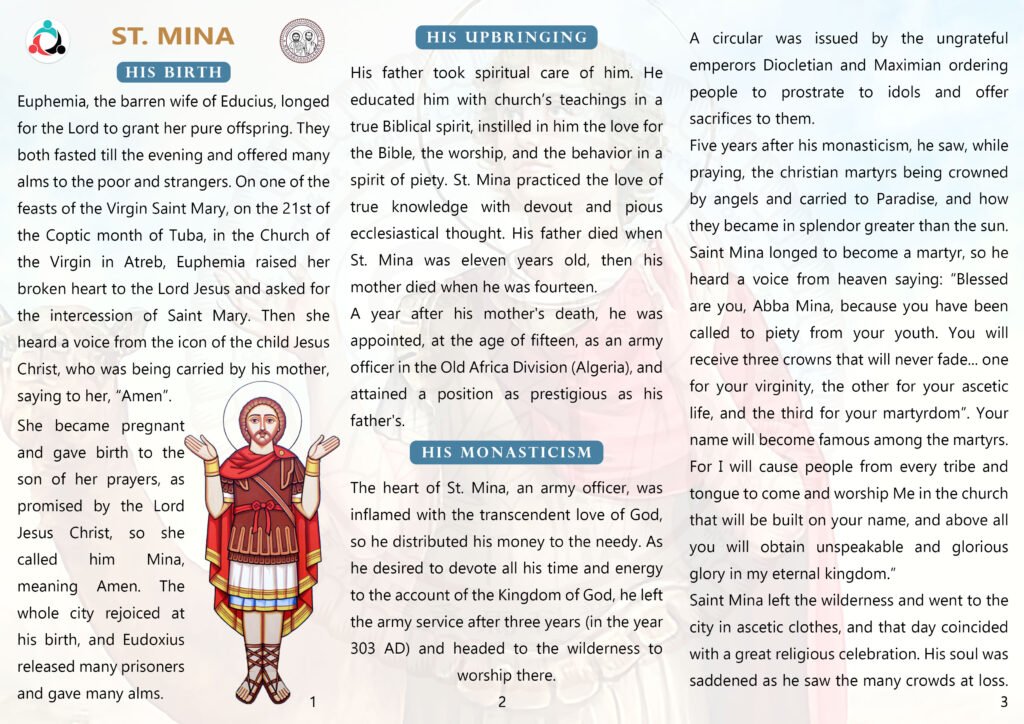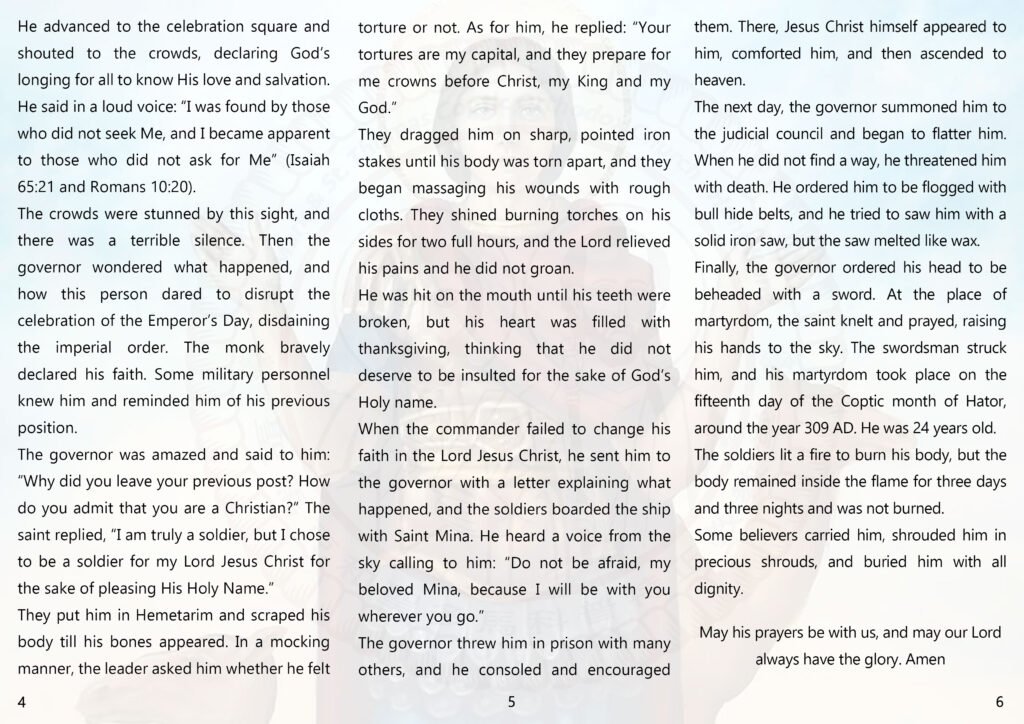His birth:
Euphemia, the barren wife of Educius, longed for the Lord to grant her pure offspring. They both fasted till the evening and offered many alms to the poor and strangers. On one of the feasts of the Virgin Saint Mary, on the 21st of the Coptic month of Tuba, in the Church of the Virgin in Atreb, Euphemia raised her broken heart to the Lord Jesus and asked for the intercession of Saint Mary. Then she heard a voice from the icon of the child Jesus Christ, who was being carried by his mother, saying to her, “Amen”.
She became pregnant and gave birth to the son of her prayers, as promised by the Lord Jesus Christ, so she called him Mina, meaning Amen. The whole city rejoiced at his birth, and Eudoxius released many prisoners and gave many alms.
His upbringing:
His father took spiritual care of him. He educated him with church’s teachings in a true Biblical spirit, instilled in him the love for the Bible, the worship, and the behavior in a spirit of piety. St. Mina practiced the love of true knowledge with devout and pious ecclesiastical thought. His father died when St. Mina was eleven years old, then his mother died when he was fourteen.
A year after his mother’s death, he was appointed, at the age of fifteen, as an army officer in the Old Africa Division (Algeria), and attained a position as prestigious as his father’s.
His monasticism:
The heart of St. Mina, an army officer, was inflamed with the transcendent love of God, so he distributed his money to the needy. As he desired to devote all his time and energy to the account of the Kingdom of God, he left the army service after three years (in the year 303 AD) and headed to the wilderness to worship there.
A circular was issued by the ungrateful emperors Diocletian and Maximian ordering people to prostrate to idols and offer sacrifices to them.
Five years after his monasticism, he saw, while praying, the christian martyrs being crowned by angels and carried to Paradise, and how they became in splendor greater than the sun. Saint Mina longed to become a martyr, so he heard a voice from heaven saying: “Blessed are you, Abba Mina, because you have been called to piety from your youth. You will receive three crowns that will never fade… one for your virginity, the other for your ascetic life, and the third for your martyrdom”. Your name will become famous among the martyrs. For I will cause people from every tribe and tongue to come and worship Me in the church that will be built on your name, and above all you will obtain unspeakable and glorious glory in my eternal kingdom.”
Saint Mina left the wilderness and went to the city in ascetic clothes, and that day coincided with a great religious celebration. His soul was saddened as he saw the many crowds at loss. He advanced to the celebration square and shouted to the crowds, declaring God’s longing for all to know His love and salvation. He said in a loud voice: “I was found by those who did not seek Me, and I became apparent to those who did not ask for Me” (Isaiah 65:21 and Romans 10:20).
The crowds were stunned by this sight, and there was a terrible silence. Then the governor wondered what happened, and how this person dared to disrupt the celebration of the Emperor’s Day, disdaining the imperial order. The monk bravely declared his faith. Some military personnel knew him and reminded him of his previous position.
The governor was amazed and said to him: “Why did you leave your previous post? How do you admit that you are a Christian?” The saint replied, “I am truly a soldier, but I chose to be a soldier for my Lord Jesus Christ for the sake of pleasing His Holy Name.”
They put him in Hemetarim and scraped his body till his bones appeared. In a mocking manner, the leader asked him whether he felt torture or not. As for him, he replied: “Your tortures are my capital, and they prepare for me crowns before Christ, my King and my God.”
They dragged him on sharp, pointed iron stakes until his body was torn apart, and they began massaging his wounds with rough cloths. They shined burning torches on his sides for two full hours, and the Lord relieved his pains and he did not groan.
He was hit on the mouth until his teeth were broken, but his heart was filled with thanksgiving, thinking that he did not deserve to be insulted for the sake of God’s Holy name.
When the commander failed to change his faith in the Lord Jesus Christ, he sent him to the governor with a letter explaining what happened, and the soldiers boarded the ship with Saint Mina. He heard a voice from the sky calling to him: “Do not be afraid, my beloved Mina, because I will be with you wherever you go.”
The governor threw him in prison with many others, and he consoled and encouraged them. There, Jesus Christ himself appeared to him, comforted him, and then ascended to heaven.
The next day, the governor summoned him to the judicial council and began to flatter him. When he did not find a way, he threatened him with death. He ordered him to be flogged with bull hide belts, and he tried to saw him with a solid iron saw, but the saw melted like wax.
Finally, the governor ordered his head to be beheaded with a sword. At the place of martyrdom, the saint knelt and prayed, raising his hands to the sky. The swordsman struck him, and his martyrdom took place on the fifteen day of the Coptic month of Hator, around the year 309 AD. He was 24 years old.
The soldiers lit a fire to burn his body, but the body remained inside the flame for three days and three nights and was not burned.
Some believers carried him, shrouded him in precious shrouds, and buried him with all dignity.
May his prayers be with us, and may our Lord always have the glory. Amen








